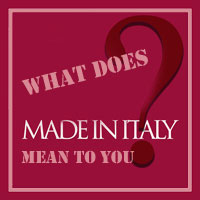| What you need to know Fashion trends Craftsmanship Collections About GLENI |
WHAT IS REALLY MEANT BY 'MADE IN ITALY' ?Our company is a keen supporter of the genuine 100% Made in Italy label, because we wish to guarantee to all our customers that the article they purchase from us is a true product of quality Italian craftsmanship. In this short poll, we would like to hear directly from you, what your expectations are of a genuine Made in Italy product and what significance this brand has for you.
This means that if an article is produced 70% abroad and 30% in Italy (in the case of a handbag the 30% could correspond more or less to the attaching of the handles and the brand's logo) such an article could be labelled as Made in Italy. However even more shocking is that even an article that has been entirely produced abroad could bear the Made in Italy label, if it has been commissioned by a firm that is based in Italy. What does all this imply? Many Italian firms, some of the prestigious fashion labels among them, choose to move a large part of their production abroad, where labour is certainly cheaper but also less skilled, but where the same amount of personel employed to make an article costs much less, allowing a substantially higher profit margin. Articles made for a few Euros in many Chinese workshops, where there is frequent use of clandestine, cheap labor forced to work at night in disgracefully unhygenic and inhuman conditions, without any social welfare or adequate remuneration, can then be brought to Italy, supplied with the label of the brand for whom these bags were made and sold in the best boutiques and shops at truly exorbitant prices. By adopting these business policies the firms manage to show excellect annual returns, sales remain high because the product still counts as Made in Italy, but the production costs are very low. In this way it is even possible to lower the prices, making this product more commercial and accessible to a wider section of the market.  This situation can't help but penalize the small to medium companies that have been making a genuine 100% Made in Italy product for generations, and who would like to continue to do so, offering a clientele, who really appreciates Italian quality, a high quality product of true craftsmanship, completely made in Italy, with quite high production costs but with the daily satisfaction of guaranteeing a product embued with the true essence of Italy, of art and beauty. Obviously the decision to keep the entire production process in Italy involves much higher management costs: the workers are professional artisans and, as is right, need to be well paid, and supplied with all the legal benefits and pension provisions; the machinery needs to guarantee a high level of finishing and so muct be regularly checked and replaced; materials have a certain cost which fluctuates according to the economic climate of the country. Taking the leather industry as an example, it is estimated that a top quality handbag, produced entirely in Italy from real leather, can end up costing around 70-100 Euros in labour costs, as opposed to the 14-20 Euro that its production would cost if it was sent to Chinese workshops or other foreign contractors. The ambiguousarticle24 of the European Customs Code (Reg EEC 2913/1992),therefore leads producers of Italian goods to make a choice between two very different levels of quality in their 'italian' goods, a choice which certainly doesn't help the prestige of the brand, but on the contrary creates doubt and confusion in the mind of the purchaser. Some decide to move their production abroad where production costs are lower or contract out the work to many Chinese workshops, often with low skills levels, where workers are obliged to work for just a few Euros a month without any form of social welfare or health provision, all in order to obtain a product that is far less prestigious in quality, not 100% Italian, but at a more economical price. Other entrepreneurs, on the other hand, decide to keep the entire produciton in Italy, guaranteeing the best quality of materials, a select workforce that is highly skilled and completely Italian, and a product that is 100% Made in Italy, but comes at a higher price, because of the higher management costs of the business and the costs of the regulated employment of the workforce. We are absolute proponents of this 'second business model' because we wish to guarantee all our customers an article that is a true product of Italian craftsmanship and quality, a product that is worthy of the Made in Italy name, but now with this short poll we would like to ask for your personal point of view on this matter Is it right, in your opinion, to denote an Italian product with the Made in Italy label, when in reality it is only 30% made in Italy? We warmly invite you to take part in our poll, so that we can get a better idea of your thoughts on this matter and understand what you really expect from a Made in Italy product, what guarantees you require from this brand and what value you put upon the Made in Italy label.
|

